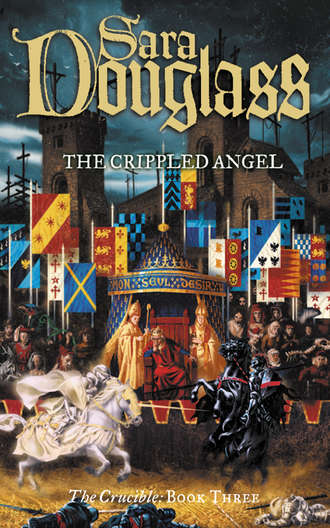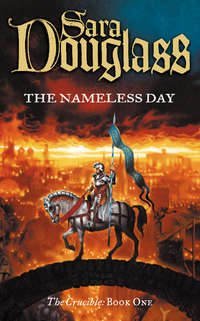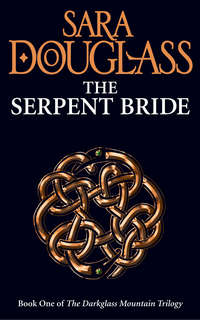
Полная версия
The Crippled Angel
Thus the inclusion of John Holland Duke of Exeter and Earl of Huntingdon at High Table. Exeter had not only been one of Richard’s closest supporters, he was also Richard’s older half-brother: Richard and Exeter shared a mother, the beautiful (and sexually adventurous) Joan of Kent, who had been married to Sir Thomas Holland before the Black Prince seized her (she’d also had a bigamous marriage to William Montague, but fortunately there’d been no children from that union). Over the past six months Bolingbroke had worked assiduously to gain the acceptance and eventual support of those nobles who’d originally supported Richard. Bolingbroke had ostracised none of them, and had presented many of them with good preferments, appointments, and, on occasion, an advantageous marriage.
Yet Bolingbroke still sat the throne uneasily. Only rarely could allegiances be changed overnight, and Bolingbroke never truly knew what the smile on a courtier’s face truly meant: allegiance, or hidden treachery.
Tonight, however, any concern about allegiances was well hidden behind smiles and courtly conversations. Mary was looking better than she had for several weeks. Her face was still pallid, but her eyes shone brightly, and her thin hands were steady as she accepted delicacies from the plates of her husband, on her left, and Raby, to her right. Bolingbroke engaged her from time to time in courtly conversation, but most of his attention was given to Northumberland, Exeter and the Abbot, who were all seated to his left.
Those whose allegiance he was most unsure of received his most gracious smiles.
Thomas Neville, watching the interplay from his spot close to the High Table, smiled himself at Bolingbroke’s efforts. Doubtless he thinks to ensure the country behind him before he embarks on his campaign of world conquest, he thought, and his smile faded a little.
It was a pity for Bolingbroke that Richard had died under such shadowy circumstances—and Neville had no doubt that Richard’s death had been an expeditious murder rather than an unfortunate fever—and not nobly in the course of battle. Neville remembered how Bolingbroke had won the support of Richard’s army outside Flint Castle with golden words rather than with bloodshed, and now he wondered if perhaps Bolingbroke hadn’t miscalculated. Perhaps he should not have called a halt to what brief battle there had been before Richard had taken a blade in the throat. Perhaps…
“Your thoughts must be all-consuming,” said a voice to Neville’s right, “for they have surely taken your attention from the feast spread before us. And such a feast!”
“Forgive me,” Neville said, smiling as he turned to face his dining companion, John Montagu Earl of Salisbury (and relative of the William who had bigamously bedded Richard’s mother, Joan). Montagu was another noble who had backed Richard—the damn hall was packed with them!—and doubtless Bolingbroke was hoping that Neville could charm Montagu as the king was doubtless charming Holland. “I was merely wondering what had so caught the abbot’s attention.”
Montagu glanced at the High Table: the Abbot of Westminster, Bolingbroke, and Holland and Northumberland had engaged in a lively conversation that had the Abbot’s cheeks a bright red with excitement.
“Our king’s plans for Westminster, perhaps,” Montagu said.
“Aye. Rumour has it that the abbot is excited at the thought of Parliament finally moving out of Westminster Abbey’s chapter house!”
Montagu laughed easily, although the fingers of his right hand toyed nervously with his knife. “Your Hal has wasted no time making his mark upon the land,” he said.
Neville’s smile did not slip at Montagu’s usage of “your Hal”. “Parliament needed somewhere new to sit,” he said. “The Chapter House was too crowded, and the abbot had spent the past fifteen years complaining of the rowdiness of both Lords and Commons.” He broadened his smile with a little effort. “He claims his meal times to have been quite ruined.”
“But to give Parliament the use of Westminster Palace… ” Montagu said. His knife was now making irritating rattling sounds as it jiggled against the side of his pewter plate.
Neville shrugged. “The palace was cold and draughty, and of little use for the family that Bolingbroke hopes to have surround him.”
“And faint hopes of that,” Montagu said in an undertone, shooting a glance towards Mary.
“It is understandable, perhaps,” Neville continued, “that he should want to refurbish the Tower instead, and make of it not only a palace fit for a king, but a warm home as well.”
“But to give Saint Stephen’s to Commons!” Montagu said, and his hand finally stopped playing with his knife as he fixed his dark eyes on Neville.
Ah, Neville thought, the crux of the matter. Parliament would now sit in Westminster Palace and, for the first time, the Houses of Lords and Commons would be permanently divided. The new home of the House of Commons was to be the supremely beautiful St Stephen’s Chapel, where Lancaster had married his Katherine, but Lords… Lords… Neville’s smile finally lost its forced thinness and blossomed into a mischievous grin.
“Commons is the much larger house,” he said, “and Saint Stephen’s can accommodate them easily.”
Montagu remained silent, now staring at his knife.
Neville fought to stop himself from laughing. “But of course, I can understand that many among the lords might be, ah, disgruntled, that they shall from henceforth sit in… the kitchens.”
It was the merriment of the nation. Although Westminster Palace had several large halls, most were currently entirely unsuitable for permanent habitation by the House of Lords. The Painted Chamber’s floor was almost rotted through, and needed replacing, while its foundations were dank with rising damp. Repairs were desperately needed. White Hall had, for over fifty years, been divided up into sundry chambers for clerks and officials of the Chancery, and it would take a generation not only for all the brick partitions to be pulled down, but for suitable storage space to be found for all the rolls and deeds of government bureaucracy, not to mention all the grumpy Chancery officials. The Great Hall of Westminster was reserved for ceremonial occasions and the daily activities of the King’s Bench, as various other legal courts.
That left the kitchens which were, in actual fact, a good choice. The great hall of the kitchen was of a similar size to the Painted Chamber, was solidly built, well lit, and, by virtue of being a kitchen, was well heated with five great hearths; and now that the palace was no longer to be used as a residence, the huge kitchen complex would no longer be needed. Once the cooks, dairy maids and butchers were moved out and the hall scrubbed, it would actually make a very good home for the House of Lords.
It was just that it was a former kitchen! While many lords accepted it in good humour—their new home would be far more commodious and comfortable than the cramped Chapter House—many grumbled about it, feeling the location a slur. The beautiful St Stephen’s went to Commons, while the lords got the kitchens…
At least the people on the streets of London and, presumably, the fields of England, have something to smile about, Neville thought.
Then, before he could speak again, the Abbot of Westminster rose to his feet, his cheeks now a deep-hued crimson (although whether with excitement or drink, Neville could not tell), and called a toast to their handsome young king, and all in the hall rose, and raised goblets towards Bolingbroke.
Much later, Bolingbroke rose, extending his arm to Mary. She rose herself, but her action was decidedly unsteady, and Bolingbroke’s eyes flew to Margaret at Neville’s side.
Margaret murmured in concern, and moved about the tables towards Mary in order to help her.
Bolingbroke’s eyes locked with Neville’s, and he tilted his head slightly.
Neville nodded, understanding. Making his apologies to both Montagu and to Katherine, Lancaster’s widow, he moved quickly and silently into the pillared aisles behind the tables.
“More wine, Tom? Surely you cannot have yet drunk yourself into stupidity.”
“Thank you, sire,” Neville said, taking the goblet that Bolingbroke extended.
“Hal,” the king said. “Call me Hal, Tom, when we are in private like this.”
Neville had left the hall and walked quickly to Bolingbroke’s private apartments as Bolingbroke said his goodnights to both his guests and to Mary. He’d waited almost half an hour in the antechamber to Bolingbroke’s suite before the king had entered, dismissed all his attendants with an impatient wave of his hand, and nodded Neville through into the inner bedchamber.
Now Bolingbroke sat in a chair before the fire, stretching out his legs and sighing. “Come, sit down, Tom. It is rare enough that we have this chance to so enjoy privacy, and there is no need for you to stand on ceremonial deference.”
Neville’s mouth twitched as he sat in a chair opposite Bolingbroke’s. Bolingbroke could pretend all he liked that it was ceremony and the business of the nation that had kept them from their former close friendship, but Neville would have none of it. He would no longer tolerate the lies that had once characterised their friendship.
“We are not the friends we once were, Hal.” Neville raised his goblet in a silent toast to Bolingbroke, but smiled, taking any potential sting from his words.
“Aye,” Bolingbroke said, looking down to his own goblet. “Well… that we are not.”
Then he looked directly back to Neville, the firelight glinting in his silver-gilt hair and lighting his pale grey eyes. “I no longer know you, Tom. And that terrifies me.”
“Why? Because you think to have lost a friend, or because you think to have lost control of me?”
Or because you fear that I will not hand my soul to Margaret when the time for my decision comes? Neville once again thanked Christ that he’d had the strength to refuse to watch Margaret transform herself into her true being while birthing Bohun. In that single refusal, Neville had, he hoped, given himself more room to manoeuvre.
Bolingbroke’s mouth twisted. “You were ever blunt with your words, Tom.” He paused, his eyes not faltering as they gazed at Neville. “I am terrified for both those reasons.”
“I thank you for your honesty,” Neville said. “If you had said anything else… ”
Bolingbroke managed a slight laugh. “What? You would have raised a rebellion?”
Neville took a sip of wine, and decided to be bold. “I can do far worse to you, Hal, should I have a mind to.”
All amusement left Bolingbroke’s face, and he leaned forward. “Do not threaten me!”
Neville leaned forward himself, taking Bolingbroke’s fury full on. “Then promise never to lie to me again!”
Bolingbroke stared a moment or two longer at Neville, then gradually the fury faded from his face and he leaned back in his chair. “I cannot afford to, can I?”
Neville also sat back, one part of his mind thinking that he and Bolingbroke were engaged in some bizarre seated dance. “Nay. Not after all the lies you have told me in the past.”
They were both silent for long minutes, thinking of the web of deception Bolingbroke, and Margaret, had spun about Neville.
It was Neville who finally broke the silence, his mouth lifting in a wry grin. “Who would have thought, Hal, that such a once intensely-devout friar would sit so comfortably with the king of demons?”
“Such are the strange twists that life takes, Tom.”
Again there was a silence, and again it was Neville who broke it.
“You have been honest with me,” he said, “and so I shall be honest with you. Do you remember that moment during your coronation when the abbot asked if there were any reason you should not take the throne? If there were any man who disputed it?”
“How can I forget it.”
“You looked at me, knowing that if I spoke, I could yet ruin your triumph.”
Bolingbroke did not speak, waiting for Neville to continue.
“That moment stretched on and on,” Neville said very softly, “as I thought.”
“And of what did you think?”
“I thought of you that day you rode your white stallion into the centre of Richard’s army outside Flint castle. I thought of what you promised them: freedom.”
“A better life,” Bolingbroke murmured, “for themselves and their families.”
“I made myself a vow in that moment,” Neville said. “I vowed that whatever your birth blood, your demonry, if you worked tirelessly and truthfully to ensure the freedom of the commons of England, those men and women who have ever loved you, then I would condemn heaven into hell if it might help you.”
Bolingbroke’s eyes widened, and he sat up slightly.
“But if,” Neville continued, “I thought that you had lied to those men and women and to England, then I would do everything I could to ensure that you were thrust down into hell.”
Bolingbroke stared, then spoke. “I did not lie, Tom. I would die if I thought it in the best interests of England’s common men and women.”
Neville shrugged, and drained his goblet. He stood up, moving to the nearby table to refill it, turning to refill Bolingbroke’s as well.
“Our friendship will never be what it once was, Hal. Not now.”
“But we can still work together? For England?”
“Aye,” Neville said, and raised his goblet. “For England.”
There was an uncomfortable silence as both men drank, then Neville spoke again. “Talking of England, I am assuming that it was for unity’s sake that you turned so much of your fabled charm on Exeter this evening?”
“I did my best, Tom. I did my best. At the least he laughed cheerily at my poor jests.”
Ah, thought Neville. Then Exeter is a dangerous man and undoubtedly thinking to raise a rebellion.
“And what words passed between you and Montagu?” Bolingbroke enquired.
“General charm, but some sourness over the new home for the House of Lords. Hal, be careful. There is yet unrest.”
“A kitchen has never caused a revolution yet, my friend. I shall have that kitchen decked out in fine emeralds and scarlets, and much gold gilding, and once the lords remember that the wine cellars lie directly beneath the former kitchen, well… ”
“I have also heard whispers—no, not from Montagu, but in the streets and stables—about Richard. Hal, some say he is not dead.”
Bolingbroke’s mouth thinned. “Trust me, he is dead.”
“Oh, I trust that you would not have him left alive to niggle at your legitimacy. But Richard’s name is powerful whether he is dead or not. A single rumour that he escaped Pontefract Castle and waits in the marches for all true Englishmen to gather at his side would be enough to destabilise your seat on that throne.”
“Richard is dead!”
“But he may still haunt you,” Neville said. “Be careful. You may be beloved of the commons, but there are many who would not weep to see you dead on the cobbles with a knife between your ribs. Richard’s name is the one they will use to thrust that knife home.”
Bolingbroke waved a hand. “I will prevail.”
“And I hope that you do,” Neville said, “for of all things I do not want another Richard to take your place.”
Bolingbroke smiled, and the atmosphere between them eased a little further. “You have taken good care of Mary,” he said. “You and Margaret. For that I thank you.”
“She is a treasure, Hal. The people on the street adore her almost as much as they do you.”
“I have been lucky in my wife,” Bolingbroke said.
“But not as lucky as you had hoped?” Neville said.
Bolingbroke sent him a sharp look. “What do you mean by that?”
“Mary will never bear you an heir. Have you thought about setting her aside?”
“That is a brutal remark, coming from one who claims that my wife is a treasure.”
“Then I ask you as a king, not as a man. As a king, you need an heir. How does the king answer my question?”
“I can never set Mary aside,” Bolingbroke said. “And that is the answer of the king.”
Neville nodded, turning to stare into the flames as he thought. No, the king could not set Mary aside, and certainly not for the woman Bolingbroke truly wanted, Catherine of France. The commons adored Mary, and would loathe Catherine. It might be the end of Bolingbroke’s kingship if he set Mary aside.
So Bolingbroke the king was going to wait for Mary the queen to die.
Neville wondered very much what Bolingbroke might do if Mary did not die. A crippled, barren wife was second only to a successful rebellion as the worst lot in life that fate could deal a king.
“And France?” Neville said.
Bolingbroke hesitated. “France? You know I will turn my attention to France sooner or later, Tom.”
“Aye.” For there lies Catherine… and untold wealth and land. “Take care you do not become another King Arthur, Hal. So caught by his glorious dreams of conquering the entire civilised world he neglected his own family where waited his doom. Remember what happened to Arthur’s dream of Camelot.”
Bolingbroke shot Neville an unreadable look, then took a deep breath. “I must to France, but not merely for the ‘glory’. France waits for me, and for you.”
“Waits for me?”
“Aye. It will be in France that the angels, no doubt using their mouthpiece Joan of Arc, will ask you for your decision, Tom. My road, as yours, will lead to France.”
Neville thought a moment, then nodded. Of course. Doubtless, Joan would present the choice on behalf of the angels. “Arthur’s dreams ended in France,” he said.
Bolingbroke stared at Neville. “Then I pray to our sweet Lord Jesus that France shall not prove the end of mine.”
III Saturday 4th May 1381 —i—
It was still dark, but Mary could hear the world stir outside her chamber windows. There was a faint, distant clattering interspersed with the low growl of men’s voices: grooms readying the horses for the day’s entertainment. There was another clatter, closer, and this noise was interspersed with more feminine voices: women in the kitchen courtyard, darting to and fro between kitchen and great hall, carting pails and dishes, readying the morning’s breakfast. And faintly, so very faintly, came the morning song of the birds: the pigeons and doves of the stables, and the wilder, lovelier melodies of the meadow birds.
Mary kept her eyes closed, her hands clenching at her sides under the light coverlets, and bent her entire will to concentrate on the sound of the birds. But it was no use. The world of stables and of kitchens kept intruding, destroying the peace of the birdsong, and soon Mary knew the world of the court and of her responsibilities as queen would also intrude in the guise of the careful voices and hands of her waiting women.
Reluctantly, she opened her eyes. Just a slit, a glance under her lashes, for Mary did not want anyone who might be watching to know she was awake. Still dark, it appeared that there was, as yet, no one up and moving about the chamber, but now Mary could hear the altered breathing of the two women who slept on pallets at the foot of her bed. Mary realised they were awake, steeling themselves to rise in the cold air of the chamber. Once they had gathered their bravery, and risen to pull on some clothes, they would stoke the fire in the hearth, air Mary’s clothes before it, and fetch warm water and a dish of soft white bread soaked in warm, watered wine from the kitchens. When all this was done, they would turn their attention to Mary, and ask her gently if she felt well enough to rise against the day; if she felt well enough to take some bread and wine.
Did she?
Mary closed her eyes again and concentrated on her body’s aches and pains. The great hard lump in her lower belly sat as rocklike and as unforgiving as it did every day. If she tried to move slightly in her bed, then Mary knew her flesh would drag and catch about the unmoving mass as if it were seaweed caught at a shoreline by a great rock. But at least today the lump did not send lancing fingers of pain throughout her flesh, and for that Mary was grateful.
On the days that the lump woke, and raged, she could hardly bear to live.
But if the lump lay quiescent, then the great bones of her legs, and those of her lower back, ached abominably. This was a new discomfort, and Mary wondered at it. She had not ventured far beyond her chamber in the past weeks: on most evenings to the great hall for evening supper, and sometimes to the courtyard if it were sunny and warm enough, and even then Thomas Neville generally carried her, so Mary knew there was no reason her bones should be complaining. Had they grown tired of their enforced resting?
Or was this some new manifestation of her illness? Tears formed behind Mary’s closed eyelids, and she fought to keep her breathing steady and slow, lest she alert her waiting women to her distress.
No, sweet Jesu, let not this affliction have struck my bones as well.
Had she not prayed enough? Confessed her every evil thought? Had sweet Jesu found her wanting in some way that now she was to be further punished?
Mary had spent the past year trying her best not to complain and not to fear, knowing that her illness was a test sent by God. She would not fail.
But, oh sweet Jesu! It was so hard! So hard.
It was not the pain that distressed Mary, but her ever increasing sense of complete failure. She’d failed as a woman, as a wife, and as a queen. As a woman she had shrunk from her husband’s attentions, as a wife she had not been able to bear her husband a living child, and as a queen, she had not only failed in her duty to provide the realm with an heir, but she had not been able to perform those duties that a queen should—as a helpmeet to her husband the king, so that he could the better shoulder the onerous duties of office.
Every time that Bolingbroke held her hand most gently, and told her with an even greater gentleness that she was not to fret about it, Mary felt even worse, and even more the failure.
And on those days when she saw the calculation lurking behind the superficial kindness in his eyes…
Mary’s breath almost caught audibly in her throat, and she froze, wondering if her women had heard her. But, no, they still continued to lie, dozing perhaps, and not listening too closely for a sign that their mistress was awake.
For the moment, Mary did not want to give them that sign. Not just yet. A few minutes more, and then she would be prepared mentally to start her day.
Bolingbroke. Mary’s feelings for her husband ranged between the fearful and the thankful, neither of which gave her much peace. Fearful, because she well knew her husband’s lust and desire for Catherine of France, and also knew her husband enough to know he was both impatient and angry at her ill health. Her increasing, but not yet fatal, illness made Bolingbroke chafe all the more for the moment when he could publicly pursue Catherine.
Thankful, because Bolingbroke continued to be so gentle and tolerant of her in public when he might well have been dismissive, if not angry. Thankful, because Bolingbroke kept her at his side—a living part of his court—when he might have discarded her into some dank, out-of-the-way castle or manor house while he enjoyed (more openly) the comforts and company of women more suited to his needs.
Once, and not so long ago, Mary had thought to have some power over him. The English adored her when she knew they would loathe Catherine, and Mary had thought this might have stayed Bolingbroke’s hand against her.
But after what had happened to Richard… if Bolingbroke could so easily dispose of a king, then what would he do with an unwanted wife? How much longer would he tolerate her? How long did she have before—?
“What? Still abed? Women, to your feet. Pleasure awaits!”
Mary heard the two women at the foot of her bed spring to their feet, stumbling over the blankets as they did so. But she did not start, or even, for the moment, open her eyes.







